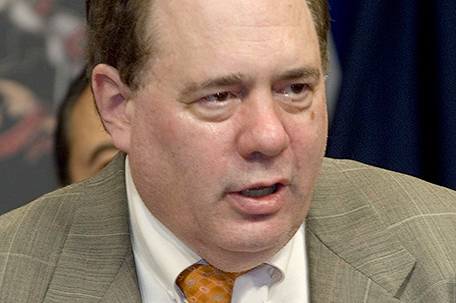
ABOVE PHOTO: Mark B. Cohen
By Arlene Edmonds
Correspondent
To Mark B. Cohen, the fact that innocent Philadelphians — many of them people of color — are without the resources to pay bail is appalling.
That these citizens are languishing in jail unnecessarily is just one of the reasons that Cohen, a former Pennsylvania State Representative, is running for one of the Democratic Common Pleas Court judge slots in the May 16 primary. He is one of 33 people competing for nine general election slots in the primary.
Keeping people in jail for low-level offenses due to their inability to pay bail is something that actually costs the city money, Cohen said. There has to be a better way to ensure that people come to court without long-term costs, he said.
“We waste $80 million imprisoning [those] who are waiting for a trial,” Cohen said. “They are simply there because they cannot afford bail. I am talking about those who are no threat to the public and will not put Philly at any risk. That’s why I’ve been looking at the no bail system in D.C.
“I see the same situation in the criminal and family court systems where there are too many delays. I want to get to the root causes of crime to reduce recidivism,” Cohen continued. “I want to speed up child support payments, adoption proceedings and divorces, so people can get on with their lives. I see ways that we can be more efficient. I could better work for this as a judge.”
During his 42 years in the State Legislature, Cohen has seen the City’s District Attorneys fight everyone from the American Civil Liberties Union to the National Rifle Association. He feels that this experience in bringing these and other divergent parties together will help facilitate faster resolutions in the courtroom.
Additionally, Cohen believes that his experience in policy will also assist in changing the relationship between Common Pleas judges and the state Supreme Court.
“Many of the decisions of the Supreme Court are based on political ideology,” Cohen said.
Consequently, Cohen sees himself as a Common Pleas judge in a unique position to bridge the gap by intervening where prior judges could, or would, not go. He said that although Supreme Court procedures are generally open to the public, rarely do the judges of the lower court intervene.
“I was one of the early supporters of the PACE (Medicare),” said Cohen, who served as Majority Caucus Leader, as well as Democratic Majority Whip. “I [was] also an early supporter of CHIP (Children’s Health Insurance Program), the Pennsylvania organ transplant program, and I introduced the first legislation that introduced the medical marijuana bill. I was also an early supporter of reforming the expungement process in Pennsylvania for non-violent offenders. I have been advocating for change that affects many of Pennsylvania’s citizens.”
Cohen was given the “environmental hero” distinction by Penn Environment. He also received an “Outstanding Service Award” from Widener University School of Law, his alma mater.
An alumnus of Central High School, Cohen was elected to the state House in a special election in 1974. He was 24 years old at that time. When his tenure in the state House ended last December, Cohen was the most senior legislator in that body.
“My record shows that I know what it takes to make our courts fairer and more efficient,” he said.
Next week: Part two will highlight how Cohen is continuing a family legacy of social justice.














Leave a Comment